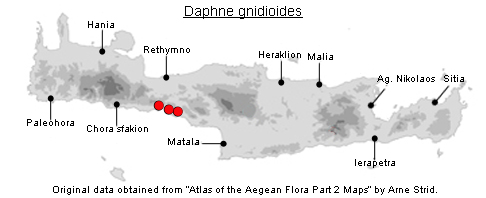
SPECIES DESCRIPTION
DAPHNE GNIDIOIDES
Family and Genus:- See- THYMELAEACEAE
Common Names:- None
Homotypic Synonyms:- None
Meaning:- Daphne (Gr) Old name for bay-laurel.
Gnidioides (Gr) From Gnidus, Crete.
General description:- Erect shrub.
Stems:-
1) Erect, sparsely leafy.
2) Branches, long, strict, stout, young shoots pubescent with brown hairs.
Leaves:-
1) 25-40 x 4-7 mm, oblong-lanceolate, cuspidate-acuminate, pungent, erect,
sessile coriaceous, glaucous, with a few appressed hairs when young, glabrous
later.
Flowers:-
1) In terminal, ebracteate heads of 5-8 and also in clusters of 2-3 in the upper leaf-
axils, subsessile, pink.
2) Hypanthium, broad, sericeous.
3) Sepals, oblong, obtuse, 1/2-2/3 as long as the hypanthium.
Fruit:-
1) Drupe, with coriaceous, scarcely fleshy exocarp, enclosed in the hypanthium till
ripe.
Key features:-
1) Flowers in small, terminal heads, with axillary dusters below them.
Habitat:- Rocky slopes with scrubland vegetation, dry open shrubby vegetation and
open coniferous woodland, 0-400(-800) m.
Distribution:- Very limited distribution in the Mediterranean. On Crete known only
from the area of Argouliano in the south coastal region. Endemic W. Crete, Aegean
& Turkey.
Flowering time:- Mainly Sept-Nov.
Photos by:- Fotis Samaritakis
